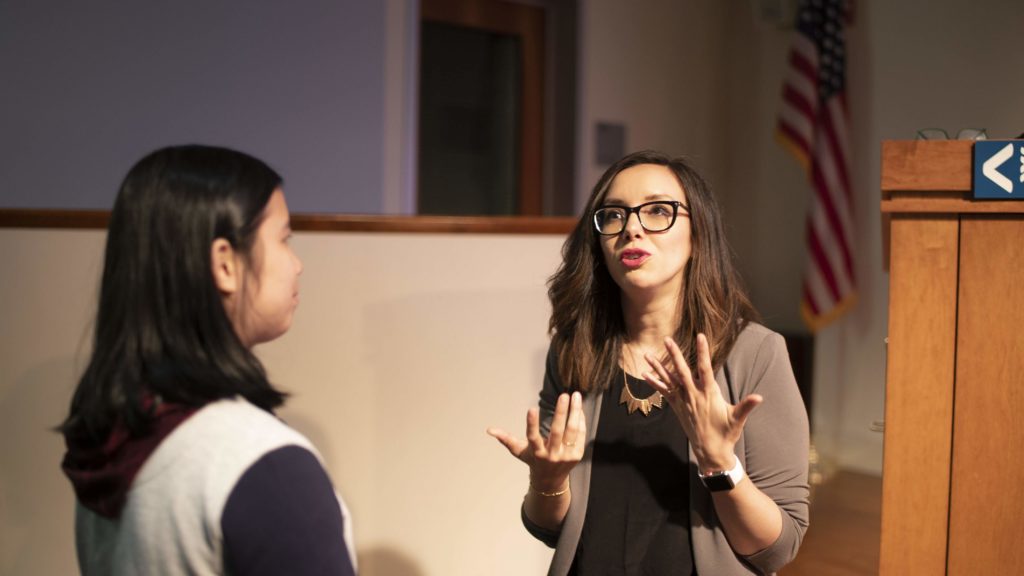If at first you don’t succeed, try, try again. If you do succeed, try, try again.
That’s the basic premise of Optimizely, a company that focuses almost exclusively on experimentation. Optimizely’s Vice President of Product Claire Vo visited the Sutardja Center’s Berkeley Method of Entrepreneurship, or BMoE, Fall Bootcamp on Wednesday to speak about the importance of experimentation.
“As an entrepreneur, experimentation is powerful from an emotional perspective,” Vo said during her talk. “If you think about everything as an experiment, failure is not as scary.”
Vo pointed out that nowadays, technology is almost instantaneously adopted, necessitating regular experimentation by companies. There is a desire for innovation from the market and from people who are funding it, which means that things are constantly changing for businesses.
As an example, Vo walked through how electric cars are changing the automotive industry. Porsche built its brand based on how it sounds — its trademark guttural revving sound — but electric cars are known for being nearly silent. Finding a way to compete in a changing environment like that is critical for companies to be able to stay afloat, said Vo.
Vo explained that there is a four part process to experimentation: hypothesis generation, design, execution and analysis. A critical aspect is data collection, which helps inform companies about the next route to take with experimentation. Figuring out what kind of data you want for your company at the beginning is important, because it’s harder to do it down the line.
“What’s the number one metric that matters to my customers? What matters to me internally? To my investors?” Vo said. “You have to have the data in order to make a decision, and you have to have the statistics to know the decision you’re making is right.”
Another issue companies face today is that customer journeys are no longer linear. For example, people no longer pay for digital news articles after hitting a paywall. Instead, they’ll jump around to other news sites or find other ways to consume information without subscribing.
To combat this, Vo said the New York Times adopted a business model that tailors subscription offerings for each visitor to their site based on their previous reading history. Once the Times realized that each visitor was different and changed up their subscription model, they saw their subscriptions increase by 50 percent.
Despite the need to bring in money, Vo emphasized that companies should “keep the guard rails on” with regard to their mission when experimenting. Although the New York Times regularly tests headlines for optimal web traffic, every headline written meets the standards set by the Times.
According to Vo, the reality of business today is that companies need to “innovate or die” to stay competitive. In order for a startup to break through and stay afloat in its respective market, Vo said it’s important to foster a spirit of continuous trial and error within the company itself.
“It’s not just a tactical application of experimentation,” Vo said, “but really as a culture, every employee needs to believe in experimentation and the culture of experimentation.”
If at first you don’t succeed, try, try again. If you do succeed, try, try again.
That’s the basic premise of Optimizely, a company that focuses almost exclusively on experimentation. Optimizely’s Vice President of Product Claire Vo visited the Sutardja Center’s Berkeley Method of Entrepreneurship, or BMoE, Fall Bootcamp on Wednesday to speak about the importance of experimentation.
“As an entrepreneur, experimentation is powerful from an emotional perspective,” Vo said during her talk. “If you think about everything as an experiment, failure is not as scary.”
Vo pointed out that nowadays, technology is almost instantaneously adopted, necessitating regular experimentation by companies. There is a desire for innovation from the market and from people who are funding it, which means that things are constantly changing for businesses.
As an example, Vo walked through how electric cars are changing the automotive industry. Porsche built its brand based on how it sounds — its trademark guttural revving sound — but electric cars are known for being nearly silent. Finding a way to compete in a changing environment like that is critical for companies to be able to stay afloat, said Vo.
Vo explained that there is a four part process to experimentation: hypothesis generation, design, execution and analysis. A critical aspect is data collection, which helps inform companies about the next route to take with experimentation. Figuring out what kind of data you want for your company at the beginning is important, because it’s harder to do it down the line.
“What’s the number one metric that matters to my customers? What matters to me internally? To my investors?” Vo said. “You have to have the data in order to make a decision, and you have to have the statistics to know the decision you’re making is right.”
Another issue companies face today is that customer journeys are no longer linear. For example, people no longer pay for digital news articles after hitting a paywall. Instead, they’ll jump around to other news sites or find other ways to consume information without subscribing.
To combat this, Vo said the New York Times adopted a business model that tailors subscription offerings for each visitor to their site based on their previous reading history. Once the Times realized that each visitor was different and changed up their subscription model, they saw their subscriptions increase by 50 percent.
Despite the need to bring in money, Vo emphasized that companies should “keep the guard rails on” with regard to their mission when experimenting. Although the New York Times regularly tests headlines for optimal web traffic, every headline written meets the standards set by the Times.
According to Vo, the reality of business today is that companies need to “innovate or die” to stay competitive. In order for a startup to break through and stay afloat in its respective market, Vo said it’s important to foster a spirit of continuous trial and error within the company itself.
“It’s not just a tactical application of experimentation,” Vo said, “but really as a culture, every employee needs to believe in experimentation and the culture of experimentation.”


